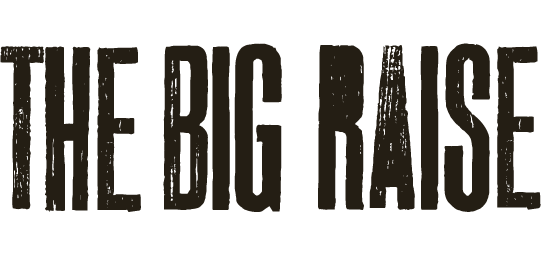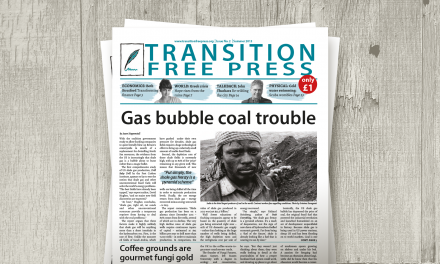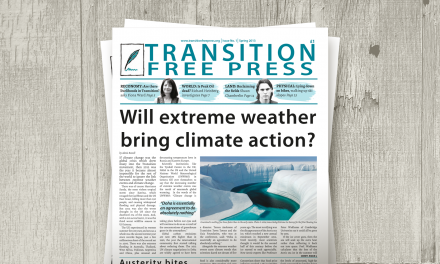“Water, water every where, Nor any drop to drink.” Coleridge’s words have a prophetic ring to them. We humans need water for life, we love it for leisure, we make art out of it; yet we also waste it, dirty it, privatise it, use it as a weapon and, most dangerously, stir it up brutally in the form of manmade climate change.
The recent Climate Impacts Report by the Intergovernmental Panel on Climate Change (IPCC) is literally dripping with references to water. Shrinking glaciers, struggling marine species, reduced crop yields, increased flooding, melting Arctic sea ice, drought – the list of water-related climate issues is long. There was no new science in the report, but the language was different – it was more dramatic, especially in terms of consequences for humans.
“Impacts from recent climate-related extremes, such as heat waves, droughts, floods, cyclones, and wildfires, reveal significant vulnerability and exposure of some ecosystems and many human systems,” it warned. Or, in the words of Dr Patricia Romero Lankao, one of the report authors, “the polar bear is us.”
Some chose to decry the report’s “alarmist” language, but most climate experts see the IPCC as ultra-cautious. “It has to be,” says Rob Hopkins, a founder of the Transition movement, “it’s a synthesis of research papers and its output has to be agreed by governments. It is, by definition, the lowest common denominator in climate science. That’s why, time and time again, the reality has been worse than the IPCC predictions.”
Britain has just experienced its wettest winter since records began. Adrian Tait, a psychotherapist and member of Transition Athelney, which is situated in the catastrophically flooded Somerset Levels, says: “People aren’t talking much about climate change explicitly, but they’re palpably fearful of future events. My interpretation is that they’ve taken something on board about changing weather patterns and the threats these pose to the Somerset Levels.”
There’s no shortage of solutions for the Somerset Levels in the recent Blueprint for Water Coalition report: “Restoring wetlands, planting wet woodlands, encouraging rivers to meander over the floodplain and creating ‘upstream’ holding areas and buffer strips are just some of the ‘slow water’ techniques which allow time for underground reserves to fill and prevent flash flood peaks racing downstream,” it says.
Cities are just as much at risk of flooding and London did this winter. Germany is a leader in urban flood management. German councils have the right to introduce charges for hard surfaces or even to take a ‘zero tolerance’ approach. Thomas Kirchmayer of Transition Ingolstadt in Bavaria says: “When we built our house we had to prove that all rainwater would drain away within our grounds. Not even a litre could go into the sewers!”
In other parts of the planet the problem is lack of water. California has been enduring its worst drought for 500 years. Its largest city, Los Angeles, imports 89% of its water. Pumping it to end users costs around $1bn. In a crazy, unbalanced way – that’s roughly what the city spends on flood management.
Andy Lipkis of the environmental group, Tree People, is trying to persuade Los Angeles to capture the rain rather than push it down the sewers. “The water that does fall here is estimated at today’s usage to provide potentially 30-33% of the water we need in Los Angeles,” he says. “But if we were to capture it and use it really efficiently – let’s say we were to double our efficiency – that would be 60% of the water we need.”
At the edges of these debates about too little or too much water is perhaps the beginning of a new narrative. Tim Palmer, author of Rivers of California, says: “Water’s long-term availability raises questions about the sustainability of growth itself.”
The UK government’s former Chief Scientific Adviser, Sir David King, believes “GDP rise in the face of the impact of extreme weather events is unrealistic.” Joanne Poyourow of Californian Transition group, Environmental Change-Makers, notes that: “Local organisations which weren’t founded for environmental or climate-based issues are now embedding these topics in their descriptions of why they do what they do.”
Amid the manmade chaos, says British water artist, Amy Sharrocks, we need to remind ourselves of the inherent wonder of water: “It fulfils our most basic need and offers us some of our greatest joys,” she enthuses. “A cool glass of water, the comfort of a cup of tea, the consolation of a hot bath, a water fight in a summer garden, the soothing rhythm of a mountain waterfall, the power of a wave crashing on the shore.”
“Next time it rains, instead of defending against it with an umbrella, stick your tongue out and invite it in,” she playfully suggests. “Beautiful, extraordinary water, without which the performance of everyday life would be utterly impossible – celebrate it, respect it and never, ever underestimate it.”
Alexis Rowell
First published in Transition Free Press 5 (Spring 2014).








